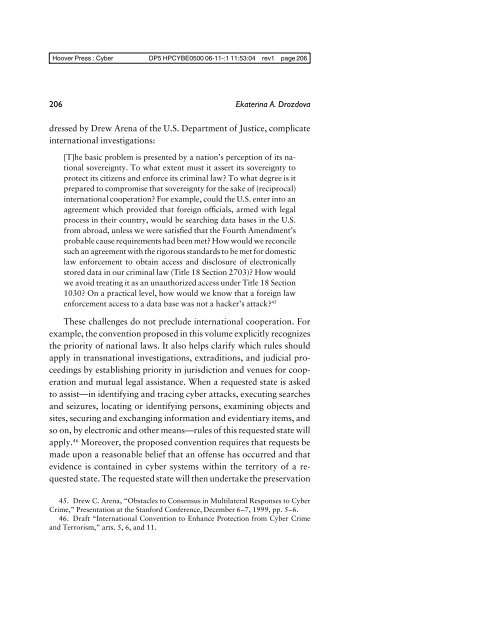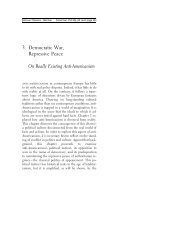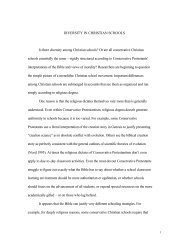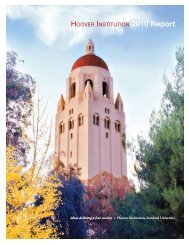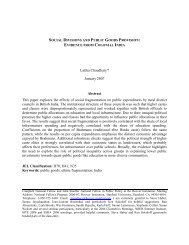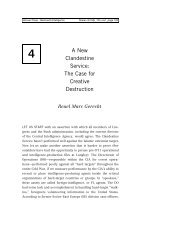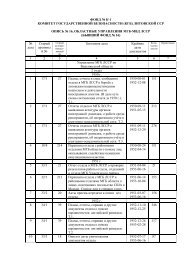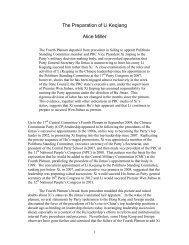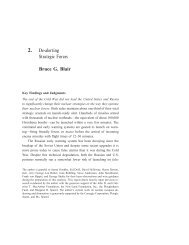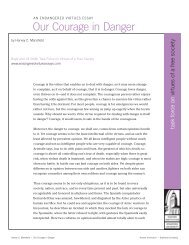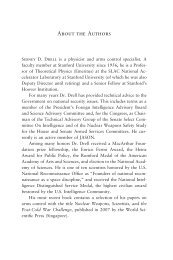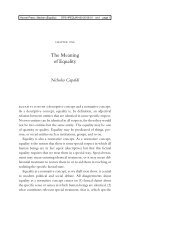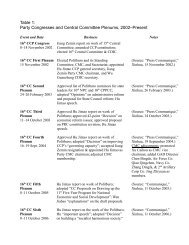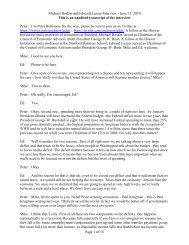Civil Liberties and Security in Cyberspace - Hoover Institution
Civil Liberties and Security in Cyberspace - Hoover Institution
Civil Liberties and Security in Cyberspace - Hoover Institution
Create successful ePaper yourself
Turn your PDF publications into a flip-book with our unique Google optimized e-Paper software.
<strong>Hoover</strong> Press : Cyber DP5 HPCYBE0500 06-11-:1 11:53:04 rev1 page 206<br />
206 Ekater<strong>in</strong>a A. Drozdova<br />
dressed by Drew Arena of the U.S. Department of Justice, complicate<br />
<strong>in</strong>ternational <strong>in</strong>vestigations:<br />
[T]he basic problem is presented by a nation’s perception of its national<br />
sovereignty. To what extent must it assert its sovereignty to<br />
protect its citizens <strong>and</strong> enforce its crim<strong>in</strong>al law? To what degree is it<br />
prepared to compromise that sovereignty for the sake of (reciprocal)<br />
<strong>in</strong>ternational cooperation? For example, could the U.S. enter <strong>in</strong>to an<br />
agreement which provided that foreign officials, armed with legal<br />
process <strong>in</strong> their country, would be search<strong>in</strong>g data bases <strong>in</strong> the U.S.<br />
from abroad, unless we were satisfied that the Fourth Amendment’s<br />
probable cause requirements had been met? How would we reconcile<br />
such an agreement with the rigorous st<strong>and</strong>ards to be met for domestic<br />
law enforcement to obta<strong>in</strong> access <strong>and</strong> disclosure of electronically<br />
stored data <strong>in</strong> our crim<strong>in</strong>al law (Title 18 Section 2703)? How would<br />
we avoid treat<strong>in</strong>g it as an unauthorized access under Title 18 Section<br />
1030? On a practical level, how would we know that a foreign law<br />
enforcement access to a data base was not a hacker’s attack? 45<br />
These challenges do not preclude <strong>in</strong>ternational cooperation. For<br />
example, the convention proposed <strong>in</strong> this volume explicitly recognizes<br />
the priority of national laws. It also helps clarify which rules should<br />
apply <strong>in</strong> transnational <strong>in</strong>vestigations, extraditions, <strong>and</strong> judicial proceed<strong>in</strong>gs<br />
by establish<strong>in</strong>g priority <strong>in</strong> jurisdiction <strong>and</strong> venues for cooperation<br />
<strong>and</strong> mutual legal assistance. When a requested state is asked<br />
to assist—<strong>in</strong> identify<strong>in</strong>g <strong>and</strong> trac<strong>in</strong>g cyber attacks, execut<strong>in</strong>g searches<br />
<strong>and</strong> seizures, locat<strong>in</strong>g or identify<strong>in</strong>g persons, exam<strong>in</strong><strong>in</strong>g objects <strong>and</strong><br />
sites, secur<strong>in</strong>g <strong>and</strong> exchang<strong>in</strong>g <strong>in</strong>formation <strong>and</strong> evidentiary items, <strong>and</strong><br />
so on, by electronic <strong>and</strong> other means—rules of this requested state will<br />
apply. 46 Moreover, the proposed convention requires that requests be<br />
made upon a reasonable belief that an offense has occurred <strong>and</strong> that<br />
evidence is conta<strong>in</strong>ed <strong>in</strong> cyber systems with<strong>in</strong> the territory of a requested<br />
state. The requested state will then undertake the preservation<br />
45. Drew C. Arena, “Obstacles to Consensus <strong>in</strong> Multilateral Responses to Cyber<br />
Crime,” Presentation at the Stanford Conference, December 6–7, 1999, pp. 5–6.<br />
46. Draft “International Convention to Enhance Protection from Cyber Crime<br />
<strong>and</strong> Terrorism,” arts. 5, 6, <strong>and</strong> 11.


